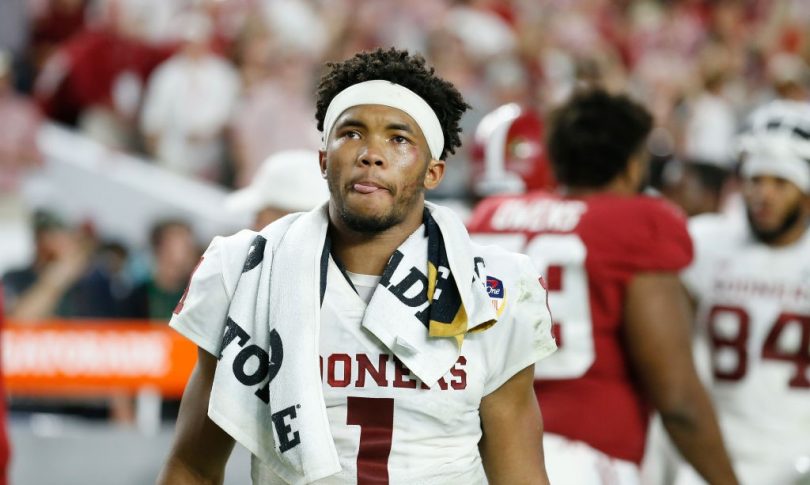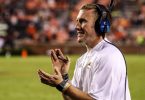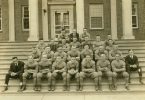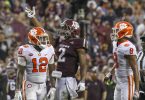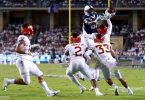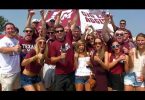FORT WORTH – As Kyler Murray dropped by to pick up lavish college football bling on Monday he described the itch that prevailed upon him to pick the NFL over a baseball career with the Oakland Athletics.
It was what bound Lucy and Desi, Brangelina, and Lady Di and Prince Charles of Club Monarch, just to name a few of the hundreds of dozens.
Love.
“My love for football,” said Murray before the Davey O’Brien National Quarterback Award banquet at the Fort Worth Club. “Obviously, it wasn’t looking good for the NFL side of things until this past season, once everybody saw what I was capable of. After the season when projections, people telling me where I could go and how the NFL felt about me … I always felt I could play in the league. It’s always been a dream of mine.”
Oftentimes, it takes more than love to make these arrangements, complicated as they can be, work out.
To the critics, love will need to be blind to Murray’s stature.
As luck would have it for the local wordsmiths, Murray’s appearance in Fort Worth was his first since announcing that he identified as an NFL quarterback.
The curious looked him over and up and down on a late Monday afternoon, as if Martin the Martian or an evening full-timer at Rick’s Cabaret had sauntered into the resplendent downtown landmark, where ghosts of the dreamers of the glory days of wildcatting still roam.
One needed not any of the measuring tools of the upcoming scouting combine to make at least one observation about this NFL prospect, whose playing future in a flash became brighter than a Bethlehem north star in December.
The truth is, the Oklahoma Sooners quarterback and most recent Heisman Trophy recipient is bigger and taller than … Davey O’Brien.
“Yes, I did know that,” Murray said when asked if he knew O’Brien suffered from NFL Short Person Syndrome. “Me and him have something in common.”
He quickly clarified. That did not mean he was saying he was O’Brien’s 5-foot-7. Or, he said in a subtle sneer, the 5-8 some seem to think he is.

Murray has formed a pat short answer for any inquiries from non-scouts about his size: “I don’t measure myself when I wake up.”
As he stood after answering the questions for the daily diaries, it was fairly clear to see through the eye test that Murray will check in at next week’s NFL Combine in Indianapolis right around a middling 5-10.
The 195 pounds OU professes him to be will require a scale to prove. More than his height, the frame might be the most important to scrutinize. Yet, whether he can survive the big boys and bad attitudes of NFL defenders over 17 weeks seems to concern few.
Many pundits are of the mind that only coming in less than 5-10 stood between Murray and a bank account that investors and Milburn Drysdale would love to make work for them, err, him.
Fiddlesticks … for Murray, it’s about the size of the fight in the man.
“People are going to say whatever they want to. I’m not really worried about it,” Murray said about stature-gate. “I’m never the biggest guy on the football field. I’ve said it many times: I feel like I’m the most effective guy, the best player on the field at all times. That’s not the way I think: ‘I’m the smallest guy on the field, I got to do this or that.’ I just go out there and play.
“I don’t think [size] matters at this point. There has never been a 5-10 QB projected in the first round. That’s crazy to me … the fact I’m already projected that high. I’m not over 6-foot. I haven’t seen that since I’ve been alive.”
In other words, he is a unique talent.

As has been well-documented, it’s difficult to recall a relative petite first-round quarterback. Most are something akin to Lurch or Luka Doncic.
That was the QB prototype in the era of Jim Plunkett, who was either a believer or a gracious guest, perhaps both. The two-time Super Bowl winner with the Raiders was the recipient of the Davey O’Brien Legends Award.
“The game has changed a little bit,” Plunkett said when asked about Murray’s prospects. “The fullback is almost gone. The spread offenses, with five receivers, sometimes six. Your running back has to be able to catch the ball. It’s a different game.
“He can get rid of the ball quickly as he does. I see no problem with him performing well in the NFL. None at all.”
Murray’s experience is a testament to how quickly things can change. A year ago, a professional football career seemed as likely as an O.J. acquittal or a Trump presidency.
But as the embers of love burned within him, Murray threw a curveball on NFL talent evaluators with more than 4,300 yards and 42 touchdowns last season. That hasn’t stopped the critics, who emphasized the state of defense in the Big 12, and a less-than-sterling first half – the one that counted – in a College Football Playoff against Alabama.
Size isn’t the only thing that connects Murray and O’Brien.
O’Brien had a dream – a first love – in his life, too. It wasn’t the Redskins he wanted to defeat but rather gangsters as one of J. Edgar Hoover’s elite crime fighters at the FBI. He left pro football after only two seasons to do that, walking away from a contract that paid him something in the neighborhood of $360,000 in today’s money. (There are conflicting reports about his compensation.)
O’Brien left the love of his life – the FBI – after only 10 years.
Like Murray, O’Brien was considered by many in his time as “the grandest player pound for pound.” Arizona coach Kliff Kingsbury vowed only a few months ago – while he was still climbing the NFL ladder by guiding Texas Tech to mediocrity – that he’d make Murray the No. 1 overall pick.
Kingsbury will get a chance to put his pick where his mouth is.
However it goes down, if not the first pick or the first quarterback, Murray isn’t expected to get out of the top 10.
That would all undoubtedly please O’Brien, who went No. 4 in the 1939 NFL Draft. His teammate Ki Aldrich went No. 1 overall.
Certainly, the eras couldn’t be any more different, but O’Brien, almost 80 years later, would’ve been a fan of this winner of the award named for him. In fact, O’Brien could’ve been talking to this 21-year-old – and the doubters — when he walked away in 1940.
“I can sincerely say that college and professional football is just like high school and college ball,” O’Brien said. “A player naturally improves with experience and that is what he owns when he enters pro ball. You are thrown into the cream of the crop in professional ball and the play is naturally faster.
“They are just like the boys I knew in college. Not much difference at all – except, of course, it helps to know you are going to get a paycheck on Monday night.”
A bigger, ahem, more sizable check than what the major leagues are paying upfront.
Murray is following his gut on this one. Instinct is a pretty important asset for a QB, too.
We’ll find out about all this eventually.
In the end, love rejoices when the truth wins out.

